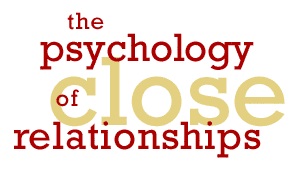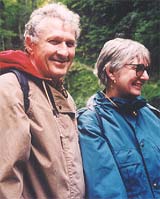  |
  |
 Richard Rapson and Elaine Hatfield
|
 Our CR experts for Session Three are a husband-and-wife team of researchers and writers on the topic of interpersonal attraction and intimacy. Dr. Elaine Hatfield is Professor of Psychology at the University of Hawaii, while Dr. Richard Rapson is Professor of History and a psychotherapist in practice with his wife. The study of love and intimacy was new and somewhat controversial when you began your work in the 1960s. Was it difficult for you to choose this research focus at that time? EH: Though my early education in psychology focused on traditional subjects such as animal learning and motivation, by the time I entered the graduate program at Stanford University in 1959, I was interested in passionate love in particular and human emotions in general. I felt that learning theory failed to explain such powerful experiences very well. New research would be necessary, which I decided to conduct. It might not have been a politically smart choice for me, career-wise. At that time, passionate love certainly wasn't considered an important phenomenon in the discipline of psychology -- and, worst of all, the topic was not considered academically respectable. So what motivated you to continue? EH: I felt that love and intimacy were, if not academically, then personally extremely important topics. For example, my grad school classmates and I usually spent some social time together and shared our personal concerns. Late in the evenings, when our research and teaching work was done for the day, we would confide in each other about our problems. Most of us agreed that the rigors of graduate study were taking a toll on our romantic lives. Most of us had endured some real trouble or difficulty in our relationships. Some of us couldn't find anyone to date; others were already getting divorces. Some even admitted that their situations were so horrific, they'd even considered suicide! It seemed to me that people's real relationship experiences deserved the attention of careful researchers. Why not me? In the early 1970's, your work with Dr. Ellen Berscheid was "honored" by national criticism when then Sen. William Proxmire awarded the two of you his infamous "Golden Fleece Award," charging that your work represented a waste of federal funds and a fleecing of the taxpayers. Specifically, he declared that most people simply did not want to know why people fall in love. But for some people, this "award" backfired, and it just made the study of love more popular. Today, you and Dr. Berscheid are seen as trailblazers who braved public criticism to begin vital research. Do you look back on those days now with a sense of humor and vindication? EH: Actually I take no pleasure in remembering those "bad old days." When Ellen Berscheid and I were asked to write a book on interpersonal attraction, we wanted to include a chapter on romantic love -- and we discovered there was nothing about it in the psychology literature! We applied for and won a National Science Foundation grant to learn what people meant when they said they were in "love." Sen. Proxmire's award gave us the kind of publicity no researcher wants. And opposition seemed to come from everywhere. Not only Proxmire, but many of our colleagues agreed that myths of love should be left to poets and moviemakers. If you're going to get the work done, you can't answer every critic, but it's still very difficult to live with so much opposition to even asking questions. I knew the battle had to be fought, of course. But, although the field of close relationships is "hot" today, fighting the good fight was never much fun. One of your best known pieces of research is the Computer Dance Study in which you found that physical attraction was the single most influential factor in college students' desire to pursue dating relationships with others. Did it turn out as you had expected? EH: The Computer Dance Study is memory because it demonstrates, first, that if students are interested in what you are doing and they are having fun, they will go to great trouble to help you out. Our subjects agreed to answer many questions and to spend time with blind dates, all at least in part to help us learn about attraction. Second, in research, unlike religion, you often find out you were wrong. We had assumed many important Freudian factors would actually shape romantic attraction. Were we wrong! It was looks, looks, looks. Why is physical appearance so important in dating relationships? EH: Beauty is a rare gift. It is natural to celebrate it. "Capturing" a beautiful mate confers status in a competitive world. And as the evolutionary psychologists point out, a robust, symmetrical appearance may be a marker of good healthy, fertility and longevity. Does studying love and intimacy make a difference? Has it changed your own experience? RR: When my friends and I were young, our ignorance of love and sex was nearly total. For me and many other men, women seemed to belong to another species altogether. Discussions of sex were taboo, and even love remained shrouded in mystery. My college education was excellent -- but Amherst in those days was a men's school, which did little to reduce my stupidity about women! Because we had little informal contact with women, we men wrongly assumed that marriage would be a straightforward matter. When my first marriage began to fail, I had no idea what was wrong, or what to do about it. With social changes in the world around us -- the civil unrest of the '60's, the "sexual revolution" of the '70's -- old assumptions were discarded, love and marriage were redefined, and life got better. But it was still another decade before I married well. Personally, I may have been lucky. But I also think that as a historian and psychotherapist, I have become aware of how hard it is for people to put together successful, durable relationships. Many obstacles stand in the way. Accidents can play a part in success or failure. I feel strongly that common sense and humility are healthier attitudes to bring to intimacy than Hollywood-induced fantasies about how "easy" and magical love is. EH: When I was young, I likewise knew little about love. In my first marriage, I "sensibly" chose a husband who had what seemed to matter -- good looks, intelligence, a sense of humor. I never considered whether he would put time into our relationship or be "available" for intimacy. Twenty years later, in my second marriage, I was much smarter about love. Intelligence and humor still emerge as important factors in relationship success. But my research has revealed a more complicated and interesting story -- people are extremely variable, entering relationships with unique physiology, family histories, experiences and expectations. Rarely will these factors coincide between one person and another in the world. Agreement on a few factors will make a good date but it takes much, much more to establish a good marriage. What has the study of close relationships given to you and your relationship with each other? RR: One thing that history can bring to the study of love and intimacy is perspective. We must continually learn what in our psychic lives today is novel, what is lasting; what is likely to change and what can we count on. This enlarged memory does help us devise better strategies for love and intimacy, personally and professionally. Today, many others besides ourselves recognize that intelligence and even science can guide us through the challenging channels of love. I believe this healthy recognition began with Elaine's courageous work in the 1960's. EH: I think studying close personal relationships has allowed us to embark on a joyous process of discovery. Richard and I are currently working on cross-cultural and historical determinants of passionate love and sexual desire, and there is nothing more exciting! Of course, for us, to work together is a great delight. |